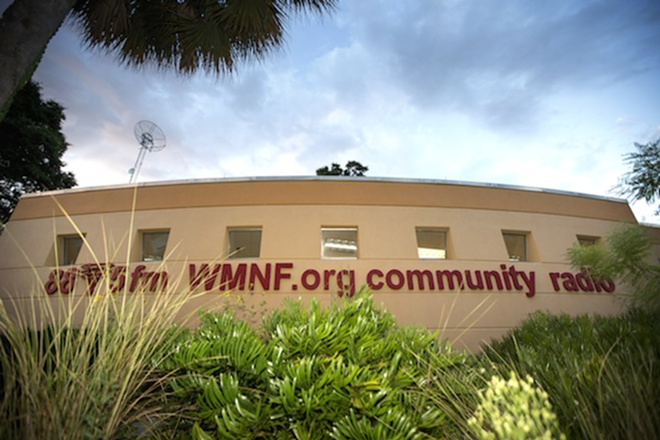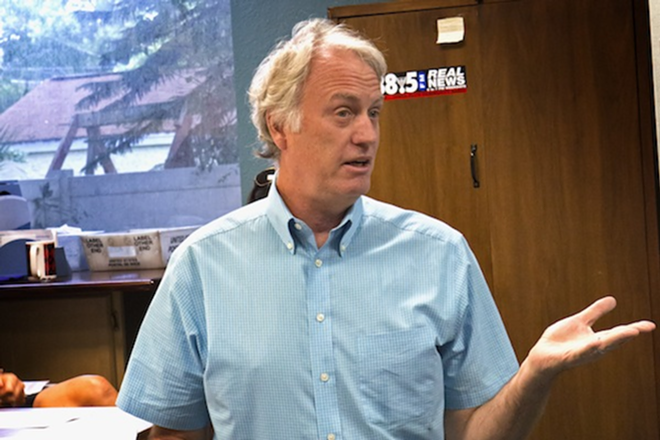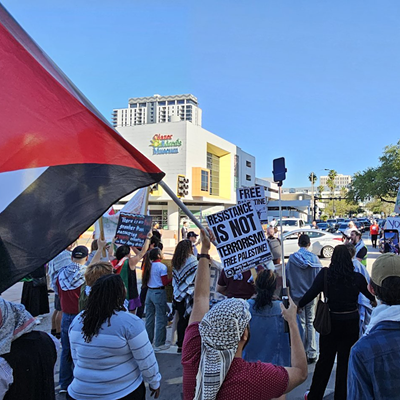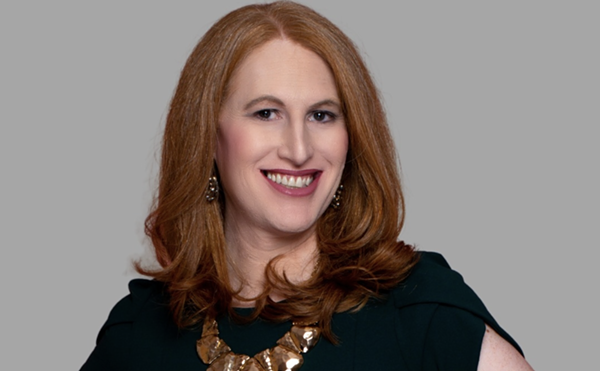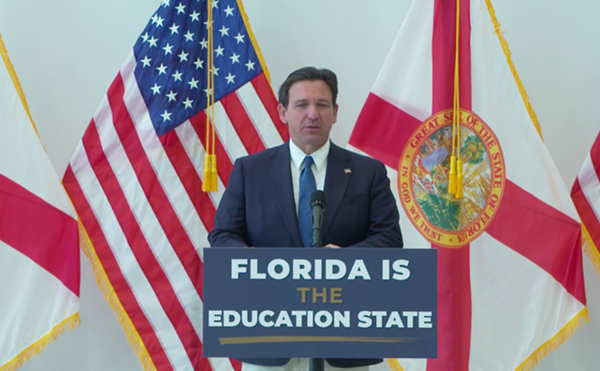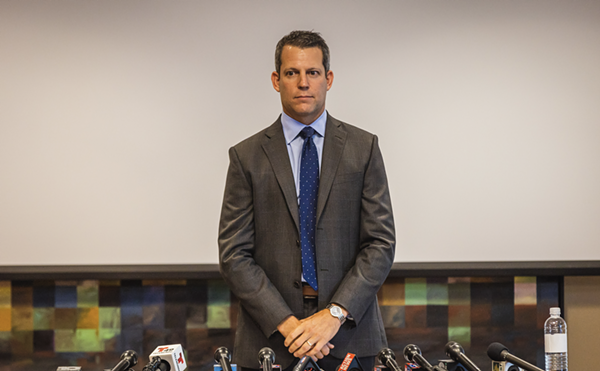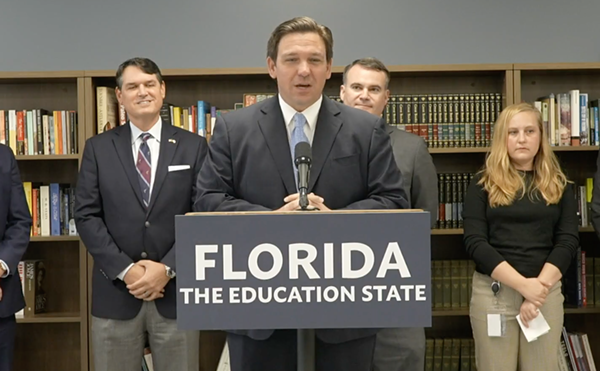Tampa’s great radio experiment, WMNF 88.5 FM, is 35 years old, and its age is beginning to show.
Once the only game in town for news, talk and music outside the mainstream, WMNF now finds itself just one of a multitude of media options vying for listeners.
Previously housed in a series of cramped, makeshift quarters, WMNF now broadcasts from a large, modern facility, with a large, modern mortgage to match.
Perhaps most troubling, its commitment to diversity, to providing a forum for minority voices, is being questioned.
“I still think it’s viable,” said Ray “Rayzilla” Villadonga, a longtime WMNF programmer. “Trying to keep it viable and surviving is really the dilemma.”
WMNF’s market share has always been small, at least compared to commercial radio stations, but for years it had it cornered. For Bay area listeners who found commercial radio’s steady diet of Top 40, classic rock, country and right-wing talk unappealing, WMNF laid out a buffet of alternative delights. World music, hip-hop, experimental and the once-underground rock artists now lumped under the alternative banner wouldn’t have been heard anywhere else besides WMNF.
Likewise, the voices of progressives, radicals, minorities and anyone else who couldn’t get a word in edgewise in mainstream media could have their say on WMNF.
Now, audiences have a host of digital and satellite options for underground music and alternative news.
“In a world where a kid who is tech-savvy can sit down in the basement and create his own channel … [WMNF’s] model doesn’t work anymore,” said Sydney White, the station’s general manager until June, when he was unceremoniously fired.
WMNF’s presentation has also come under criticism, even from those inside the station.
“One of the problems we have right now is that our announcing isn’t very good,” news director Rob Lorei said “Some hosts talk too much. I hear that from listeners’ surveys, I hear that from people inside the station.
“There are still people moving to town every day who would listen to us if they liked what we did. Well, they don’t always like what we do because we’re not presenting it as well as we could.”
“There is a set of things that listeners often complain about, people going off on tangents about nothing in particular, people talking about their personal problems, having breaks that are way too long,” said Marcie Finkelstein, host of Tuesday’s “Morning Show,” one of the station’s most popular shows and most consistent fundraisers.
Such is life with a volunteer staff, a situation that is near and dear to some WMNF hearts — and anathema to others.
Villadonga, co-host with Peter Tush of Wednesday night’s experimental music show, “Step Outside,” notes that some community stations have gone to the use of paid, professional announcers for drive-time slots.
“That formula has been successful, and it seems to be the one avenue that we can explore that we haven’t explored yet,” Villadonga said. “And I’m talking about a paid jock position, which, of course, sends people flying into petulant fits when you start saying that, but damn! The consistency,” Villadonga said.
Villladonga said Finkelstein’s show would be a good anchor for morning drive time.
“She connects with an audience like no other,” he said.
It’s an idea that doesn’t appeal to Finkelstein, however.
“I think that there are certainly improvements, myself included, that all of us can make,” Finkelstein said. “I don’t think though, that that means we should ever have paid programmers.
“The idea that we’re all in this together has always been very powerful for me. It would be odd to pay everybody and then ask the community to support us. I’m not sure what is special about that.”
What’s special about WMNF may be hindering its ability to attract new listeners.
“A lot of what we’re doing is keeping the audience from growing, but at the same time, I’m not sure where we can go with it,” said program director Randy Wind. “A more focused appeal is going to get more listeners. And that’s in opposition to a lot of what WMNF’s mission is about and what WMNF’s traditions are all about.”
Across the country, most public and community radio stations have streamlined their formats, moving to all news and talk, as Tampa’s WUSF, 89.7, did in 2011, or moving to all-music formats. All news and talk is a no-go for WMNF, though, as it would put them in direct competition with WUSF and its slate of popular NPR programs. But WMNF’s stated commitment to peace and social justice issues means an all-music format would be incompatible as well.
The station plans to roll out programming changes in the new year. Wind chaired an Aug. 27 meeting at which programmers and listeners discussed programming options. The meeting produced plenty of discussion and comments, but no consensus. Tightening the format had its supporters, but plenty of detractors as well.
“The music programming is monotonous,” said Julia Jones of the station’s 7 a.m. to 7 p.m. music blocks, which tend toward acoustic music in the morning, alternative rock and Americana in the afternoon.
Jones was the host of “Global Rhythms,” which aired on WMNF from 2009-2011. On it, she said, she played music from all around the world and, through the internet, connected with listeners from around the globe as well. Jones laments the “second-class citizenship” of shows that play hip-hop and other forms of music with more appeal to a young, African-American audience.
“It’s like an integrated school with segregated classrooms,” Jones said. “WMNF needs to embrace diversity to serve the community as it is. We need a bigger and broader coalition of voices.”
Diversity is a key issue for the station. It’s written into its mission statement. WMNF has traditionally been the one source in the area for music, news and views pertaining to women, gays, Latinos, African-Americans and other demographics underserved by the mainstream.
However, while women make up much of the station’s staff and board of directors and staff, the station remains overwhelmingly Caucasian.
“We have in the past had more diverse boards, but currently right now we don’t and to me it’s a glaring situation that we need to overcome,” said Nancy Cox-Johnson, who chairs WMNF’s Board of Directors.
“We need more African-American representation on the board,” she said, adding, “we need it everywhere: more diversity in programming and more talking to different populations, including the Latino population.”
“Increasing our diversity on the board and our volunteer committee is a top priority right now to the entire staff, the various committees and the board,” said Michael Bagby, board member, chair of the Diversity Committee and host of “Jangle Junction” under the name KTUF. The committee, Johnson said, “is proactively working towards increasing our focus on all walks of life, all ethnicities, all gender preferences, ages, socio-economic levels into our fold.”
Coming into the WMNF fold means embracing its culture, something that proved difficult for Sydney White. White, a public radio veteran, was brought in as station manager in 2011 to replace Jim Bennett, whose departure was attributed only to personal reasons.
White himself was fired suddenly in June with, he said, no warning.
“It’s structured like a club, a glorified radio club,” White said following his dismissal.
To him, the station’s format of multiple programmers simply doesn’t work anymore.
“It’s community radio culture,” White said. “I’ve worked with a lot of community radio stations. I understand the way they operate but I also know that it’s a culture that has to change, because if it doesn’t change in today’s environment, it doesn’t exist. It’s not business as usual.
“But you also understand that people have been doing the same things for 30 years. The culture is that everybody goes in and does a show. We don’t produce radio like that anymore.”
“We’re looking at the culture of the station,” Johnson said when asked how the station will avoid another short-lived general manager. “We’ve had some problems with GMs and a lot of it is embracing the culture.”
“There is this kind of boys and girls club mentality, that is, I think, that’s the culture,” said Ray Villadonga, a longtime volunteer and programmer at the station. “That’s why there’s resistance to change, because within this boys and girls club, everybody feels like it’s not broken.”
“I think it’s very hard for someone to come from the outside,” said Greg Musselman, a longtime volunteer who was general manager of the station from 1990-1995. “They have different experiences and may come with different expectations. We’ve grown here, but it grew in a very sort of insulated community. And so some of these folks come in and they don’t know the players and don’t know the area. They have their own preconceptions and I think that’s hard. It’s very hard.
“I had an advantage in that I did know people and had been around the station for a bit and had an idea what the model was,” Musselman said. “But it’s very different to be at the helm. It’s about the hardest job I ever had.”
It was at least partly finances, though, and not culture, that led to White’s dismissal. His fiscal year 2014 budget was predicated on a big increase in revenues, which didn’t occur. When his fiscal year 2015 budget offered more of the same, the board said yes. Then it said no.
“Sydney created an unmeetable goal, as was realized soon after its yes vote by the Board,” Johnson said. “The reason for its acceptance was because we hoped there would be timely planning for events and fundraising efforts. We had great belief in Dr. White due to his background with NPR and other notable media. He was a lovely man, respected by all, but we waited and things didn’t happen.”
The new budget, approved by the board Aug. 26, still runs a deficit, although a much smaller one than what White proposed. But the station is operating under full staffing power, with several positions, including a reporter and web manager, remaining unfilled.
Many of the WMNF’s financial woes can be attributed to its striking new home.
The station moved into its new facility in 2005, a 12,000 square-foot building housing three broadcast studios, two production studios and a live performance studio. The “crystal palace,” as Villadonga calls it, puts many commercial radio facilities to shame.
“You go to Clear Channel stations and they are like tiny little rooms and there are three or four stations broadcasting out of strip mall,” Villadonga said.
The station found itself with a $600,000 mortgage as the economy tanked and donations began to dwindle.
While the numbers have picked up and remained steady, recently, growth has been scant. Plus, the mortgage isn’t the only major expense looming.
“This building we moved into in 2005 needs a new roof and it’s gonna cost us a huge amount of money,” Lorei said. “We’re gonna have to replace our control boards and we’ve got this big microwave tower out here. It’s got to be replaced and it’s going to cost us $120,000.”
For Lorei, the move to digital can’t come fast enough.
“The amount of money we’ve invested in antennas and transmitters over the last 10 years is probably a million dollars,” Lorei said. “If we get rid of that cost, that would be a tremendous thing. Radio is kind of old-fashioned. We’re all gonna send our programming over the Internet. In the next few years people are going to get their music from their iPhone or cell phone.”
That might take a while, as the station’s web manager, Matt Cowley, left at the end of August, and the station has no plans to hire a full-time replacement.
WMNF has enormous challenges ahead as it tries to find its place in a landscape very different from the one in which it began. There are no easy answers as the station looks to increase listenership and revenue but also stay true to its mission.
Still, the station retains its solid and committed core of supporters; even its critics profess devotion.
Jones, who chastised the station for its lack of diversity, insisted that “if anybody can bridge the divide it’s WMNF. Nobody else even wants to try. I love WMNF. But it’s like when you love your children. You want them to be their best.”
“WMNF is really an amazing radio experiment that has lasted a very, very long time,” said Villadonga. “And this community is very fortunate to have something like WMNF in its midst.
“You should never lose sight of what a wonderful mission and history this station has had in the area,” he added. “That’s really something that’s irreplaceable.”

